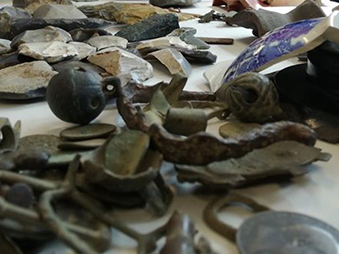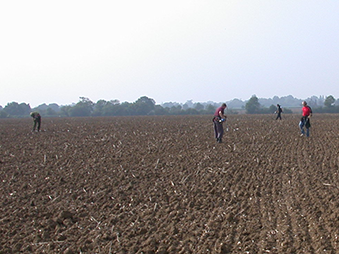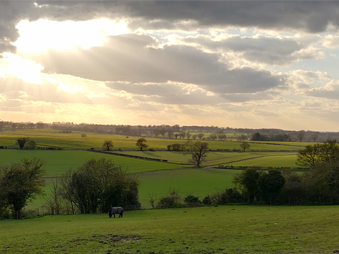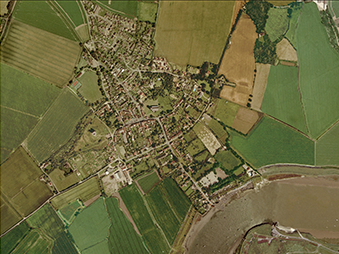Metal detecting is a popular activity in Suffolk, the results of which can be very useful to help interpret the underlying archaeology. Follow the guidance below to ensure you follow best practice when metal detecting.
Get Permission
You must obtain permission from the landowner and tenant (both should be consulted) before using a metal detector anywhere. This includes land which is publicly accessible, such as beaches, footpaths, or council-owned land. The Crown Estate owns much of the coastal foreshore and issues permits for metal detecting.
Ask the landowner if their land is subject to land management schemes and to check if metal detecting infringes the terms of the scheme. If this is the case the landowner will need to request a derogation. Check with the landowner whether there are any environmental designations (e.g. Site of Special Scientific Interest) and especially any Scheduled Monuments on or near the proposed area, which would need to be avoided.
Finds Ownership
Agree the terms of the ownership of finds in writing with the landowner before you start, as legally all objects belong to the landowner, except treasure as defined by the Treasure Act 1996.
The National Council of Metal Detecting have a template permission agreement
View the NCMD template (PDF) »
In the Field
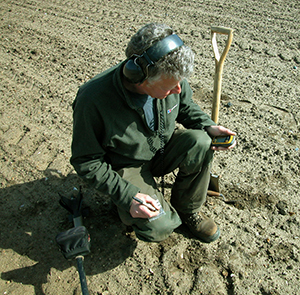
Only detect on ploughed or cultivated land, as here objects have already been removed from their original archaeological context by agricultural activity. Only detect within the depth of the plough soil. Removing objects from below the plough soil or from non-ploughed land can damage the underlying archaeology.
Detect systematically. When detecting, walk in a line and aim to cover 100% of the ground systematically, so that you do not miss anything. It is useful to keep a daily log of when you detected, the weather, soil and crop conditions, and any evidence of looting or potential archaeological features, which can sometimes be visible on ploughed land as darker or different coloured soil spreads.
Always bag and locate each object. Using a handheld GPS device, or a GPS on your phone, set to British National Grid is the best way to record the exact position of where you find individual objects. Bag every find individually and write its unique 10-figure grid reference on to the bag with a waterproof sharpie as you find the objects in the field. Also write the field name on the bag, the date and the finder’s initials. This ensures that the artefact is securely related to its location. Retain all objects until they can be identified.
Overall, detecting systematically helps to build up a more accurate and detailed picture of past activity and how it changes through time, so that we can begin to understand the extent and potential significance of the underlying archaeology.
Call the Archaeological Service for advice if you find anything fragile, complex or in situ below the plough soil, such as a hoard.
Please contact us for advice and assistance with an archaeological excavation of an archaeological find on; 01284 741230 or email sccasfinds@suffolk.gov.uk
Recording
Record all your finds with your local Finds Liaison Officer, who can help you identify and interpret your finds and so that the archaeological information is available for the future.
Report any object of possible Treasure. It is a legal obligation to report all finds of Treasure to the Coroner within 14 days. The Suffolk Finds Recording Team can help with this and the Suffolk FLOs report all treasure finds to the coroner on the finders behalf.
Find out more about the recording process »
How do I look after my finds?
Metal objects can be gently cleaned with water to remove loose soil and then should be kept as dry as possible. Avoid cleaning the surface too vigorously or using corrosive substances, as this can damage the object in the long term. Pottery and flint can be gently washed in water.
The Portable Antiquities Scheme's Conservation Guide has more advice on how to properly care for your finds
Download (PDF)at finds.org »National Code of Practice
The National Code of Practice for Responsible Metal Detecting offers more detailed information and advice. Watch the video below or download the PDF at finds.org.ukCode of Practice for Responsible Metal Detecting in England and Wales
by the Portable Antiquities Scheme
This short video explains the Code of Practice for Responsible Metal Detecting in England and Wales. If undertaken responsibly metal-detecting can make an important contribution to archaeological knowledge. This film aims to provide guidance for metal-detectorists who wish to contribute to our understanding of the history of England and Wales. It combines both the requirements of finders under the law, as well as more general voluntary guidance on accepted best practice.
1st November 2021
